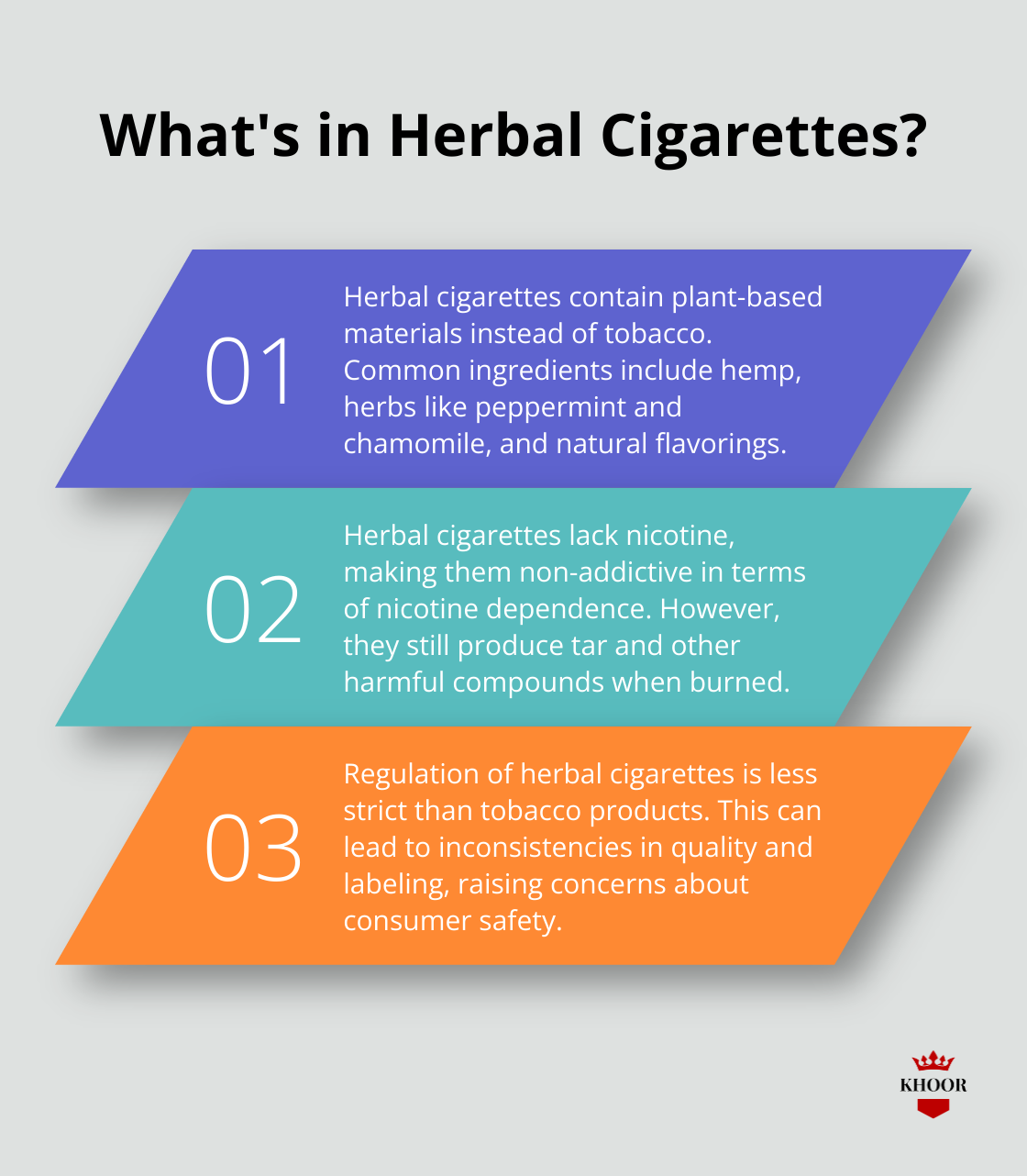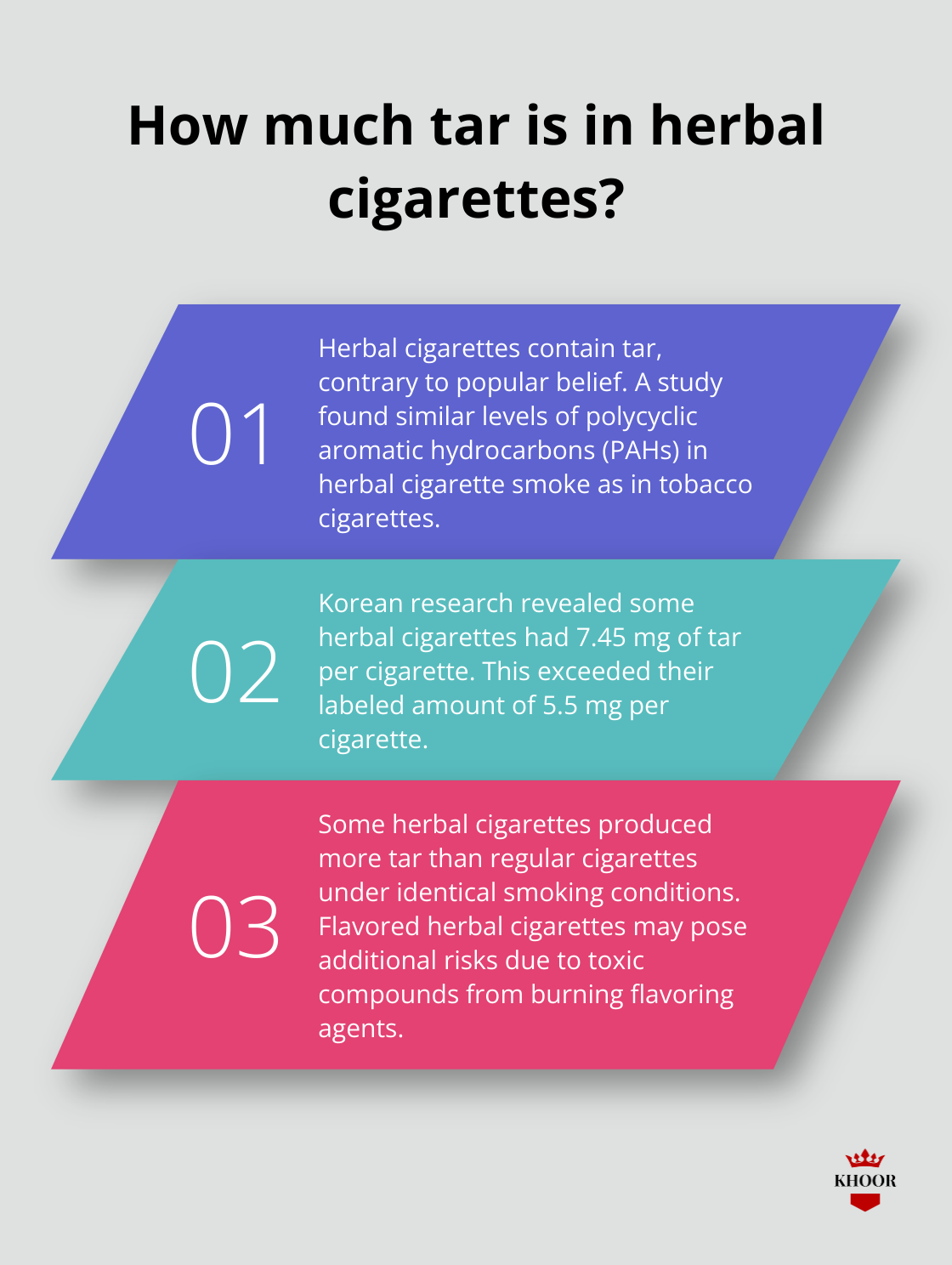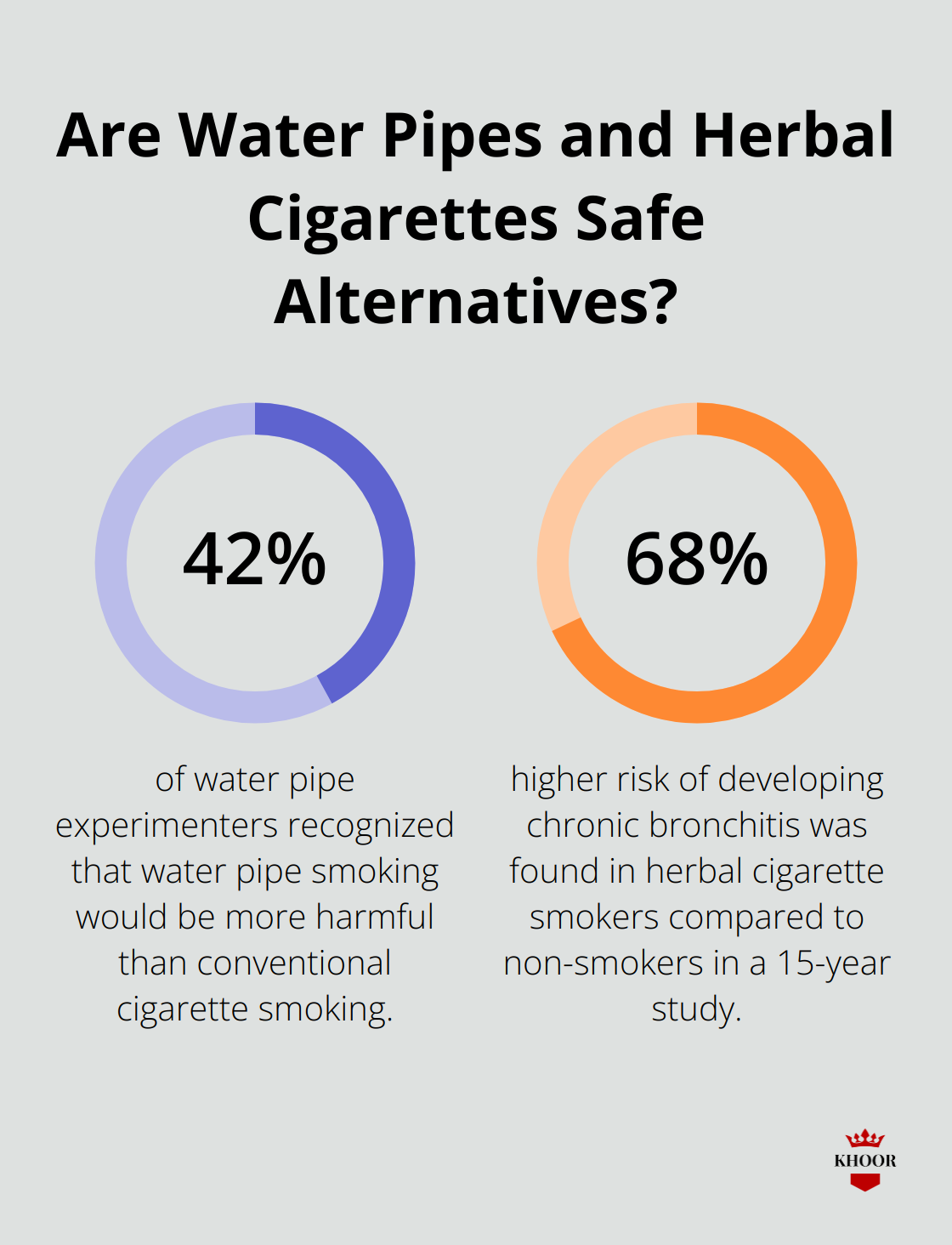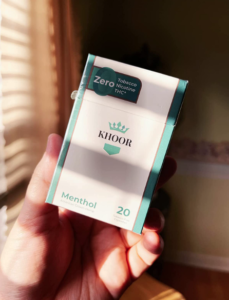
Herbal Smoking Wellness: All You Need to Know
Explore the benefits and tips of herbal smoking wellness with information on health impacts, botanical choices, and DIY blends.

At KHOOR, we often receive questions about alternative smoking options. One common query is: do herbal cigarettes contain tar?
This blog post will explore the composition of herbal cigarettes, their tar content, and the potential health implications of smoking these products. We’ll separate fact from fiction to help you make informed decisions about your health.
Herbal cigarettes are smoking products that contain a blend of plant-based materials instead of tobacco. These alternatives have gained popularity among individuals who want to quit traditional cigarettes or seek a smoking experience without nicotine. However, users must understand what these products really contain and how they compare to tobacco cigarettes.
The composition of herbal cigarettes varies widely between brands, but common ingredients include:
Hemp: Many herbal cigarettes use hemp as a base. Hemp provides a similar texture to tobacco without containing nicotine.
Herbs and Spices: Manufacturers often add herbs like peppermint, chamomile, or passionflower for flavor and purported health benefits. (Some brands incorporate organic peppermint leaf in their blend.)
Flavorings: Natural and artificial flavors enhance taste. Popular options include menthol, vanilla, and fruit flavors.
Binding Agents: Some brands use natural gums or other binding agents to hold the cigarette together.
It’s important to note that while these ingredients are generally considered safe for consumption, their safety profile changes when burned and inhaled.
The primary difference between herbal and tobacco cigarettes is the absence of nicotine and tobacco-specific compounds in herbal varieties. This makes herbal cigarettes non-addictive in terms of nicotine dependence. However, the act of smoking itself can still become a habit.

Herbal cigarettes also tend to produce less harsh smoke and may have a more pleasant aroma compared to tobacco cigarettes. This can make them more appealing to some users, especially those trying to quit smoking.
Despite these differences, users must understand that herbal cigarettes still produce tar and other harmful compounds when burned. Some herbal smokes may produce notable metabolic problems that increase the risk of several chronic metabolic diseases.
In terms of regulation, herbal cigarettes often fall into a gray area. They’re not subject to the same strict regulations as tobacco products, which can lead to inconsistencies in quality and labeling. (This lack of oversight raises concerns about consumer safety and information accessibility.)
For those considering herbal cigarettes as an alternative, thorough research and consultation with a healthcare professional are essential. While some products offer a nicotine-free option, they should not be considered a risk-free alternative to smoking.
As we explore the world of herbal cigarettes, one question often arises: do these alternatives contain tar? Let’s examine this issue in more detail in the next section.
Herbal cigarettes contain tar. This fact surprises many who assume these alternatives are tar-free. When any plant material burns, it produces tar. A study in the Journal of Toxicology and Environmental Health found that herbal cigarette smoke contained similar levels of polycyclic aromatic hydrocarbons (PAHs) – a group of chemicals in tar – as tobacco cigarettes.
Quantifying tar in herbal cigarettes presents challenges due to lack of standardized testing. However, research from the Korean Food and Drug Administration revealed some herbal cigarettes had tar levels of 7.45 mg per cigarette (exceeding their labeled amount of 5.5 mg).
Comparing tar levels between herbal and tobacco cigarettes yields surprising results. A study in the journal Tobacco Control found that some herbal cigarettes produced more tar than regular cigarettes when smoked under identical conditions.
Flavored herbal cigarettes may pose additional risks. The American Lung Association warns that flavoring agents can produce toxic compounds when burned (potentially increasing tar production).
While tar raises significant concerns, it’s not the only harmful substance in herbal cigarette smoke. Carbon monoxide levels in herbal cigarettes can exceed those in tobacco cigarettes, according to research published in the journal Nicotine & Tobacco Research.
Herbal cigarettes do not offer a safe alternative to tobacco. They produce tar and other harmful substances when burned. If you want to quit smoking, try FDA-approved nicotine replacement therapies or consult with a healthcare professional about evidence-based cessation methods.

As we uncover the truth about tar in herbal cigarettes, it becomes clear that these alternatives are not as harmless as many believe. This realization leads us to an important question: What are the real health implications of smoking herbal cigarettes? Let’s explore this topic in the next section.
Inhaling any type of smoke damages your lungs. The American Lung Association warns that burning plant material releases harmful chemicals. These include carbon monoxide, formaldehyde, and polycyclic aromatic hydrocarbons (PAHs).

A study in the Journal of Toxicology and Environmental Health found that herbal cigarette smoke contained similar levels of PAHs as tobacco smoke. These compounds are known carcinogens, increasing cancer risk regardless of their source.
Some herbal cigarette ingredients can harm when burned. For example, licorice root (a common ingredient) produces compounds linked to high blood pressure and heart problems when smoked. The National Cancer Institute reports that even natural flavorings can form toxic substances during combustion.
Clove cigarettes, popular in some regions, contain eugenol. This chemical numbs the throat, potentially leading to deeper inhalation and increased exposure to harmful smoke. The American Cancer Society warns that clove cigarettes may actually pose more danger than traditional tobacco products.
Many users mistakenly believe herbal cigarettes are safe because they lack nicotine. This misconception leads to prolonged use and increased health risks. The World Health Organization emphasizes that all forms of smoking can result in significant health problems.
A survey by the American Journal of Public Health found that more than 42% of water pipe experimenters recognized that water pipe smoking would be more harmful than conventional cigarette smoking. This false sense of security often prevents smokers from quitting altogether.
Regular use of herbal cigarettes can cause serious health issues. The Centers for Disease Control and Prevention reports that smoking any substance increases the risk of lung cancer, COPD, and heart disease.
A long-term study published in Chest Journal followed herbal cigarette smokers for 15 years. It found they had a 68% higher risk of developing chronic bronchitis compared to non-smokers.
While herbal cigarettes don’t contain nicotine, the act of smoking itself can become addictive. The ritual and hand-to-mouth action create a psychological dependence that’s hard to break. This can make quitting more challenging, even without chemical addiction.
If you want to quit smoking, try FDA-approved methods like nicotine replacement therapy or prescription medications. These options have proven track records and offer much more safety than switching to herbal cigarettes. (For those seeking a tobacco-free alternative, KHOOR offers premium herbal cigarettes that provide a satisfying experience without nicotine or tobacco.)
Herbal cigarettes contain tar, just like traditional tobacco cigarettes. This fact challenges the common misconception that herbal alternatives offer a safe option for smokers. Herbal cigarettes can contain similar or even higher levels of tar compared to tobacco cigarettes, along with other harmful substances like carbon monoxide and polycyclic aromatic hydrocarbons.

Any form of smoking, whether herbal or tobacco-based, poses significant health risks. The act of inhaling smoke from burning plant material introduces toxins into your body, potentially leading to serious long-term health consequences. For those seeking a smoking-like experience without the harmful effects, it’s essential to explore safer alternatives.
While no smoking product is entirely risk-free, KHOOR offers premium herbal cigarettes that provide a satisfying experience without nicotine or tobacco. These alternatives can serve as a step towards reducing harm for those unable to quit smoking entirely. (However, the most effective way to protect your health remains avoiding smoking altogether.)

Explore the benefits and tips of herbal smoking wellness with information on health impacts, botanical choices, and DIY blends.

Explore how KHOOR supports nicotine replacement with herbal cigarettes, success rates, and user stories for a healthier, smoke-free life.

Explore the benefits of quitting tobacco & nicotine with healthy alternatives. Improve your health and well-being with tips and data-backed advice.

Achieve your quit smoking goals with KHOOR’s supportive approach. Discover benefits, statistics, and practical tips for a healthier life.

Explore practical tips to smoke without nicotine, including product recommendations and real-life statistics to support your healthier lifestyle choices.

Explore tobacco-free alternatives with KHOOR. Learn about options like herbal cigarettes, nicotine pouches, and vaping for a healthier lifestyle.